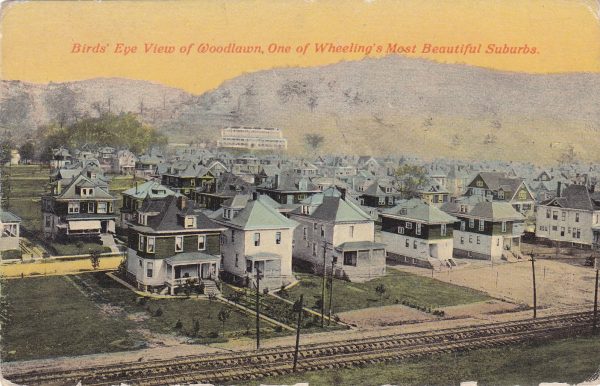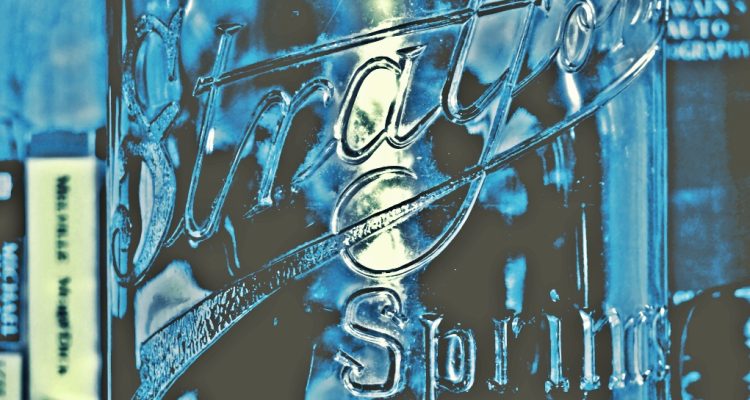World War II had ended. Soldiers returned to our beloved country. Those soldiers settled down and immediately started reproducing. That meant that there would be another generation born to pick up arms. Woodsdale kids were the next set of warriors. All those fathers brought home with them souvenirs from the big war. That meant in the attic of every home there were war relics. In Dr. Liebold’s attic was a German Luger. (Thank God Dr. Liebold had the good sense not to leave any bullets around. Many times we picked up that gun and played with it.) In addition to guns, there were shovels, or entrenching tools, canteens, bayonets, and everything you needed to launch an assault on “The Hill.” Of course if you could not get what you needed, you could always go into the Army Navy Store and get other necessities, like the prized machete.
The Army Navy store was the most wonderful store in town for a young boy to visit. I cannot recall the name of the man who owned the store, but he was a Jewish target of the Nazis. Always seemed strange that he would be selling used war equipment. His store was such a wonderful mess. Stuff was strewn or stacked in every nook and cranny. As your eyes danced about, there were old dummy bombs, practice hand grenades, tents, and all the neatest stuff any boy could crave. Since no wars were going on nearby, stuff sold cheaply. For some odd reason one day the store was “modernized.” Everything was put on shelves and in neat order. You could find things easily. It completely ruined the store.
Boredom in my childhood was not at all like today. You did not run inside and play some computer game. Nope, you organized an adventure. On “ The Hill” the known universe always had to be extended. So when we got bored, we assaulted “ The Hill.” The Hill was over by the place where the original Stratford Springs existed. As a child no man had ever gone beyond “Big Rock.” Big Rock was a very large boulder. The Indian Chief used to sit on the rock and have all his Indians gather in front of him down below. The Indian Chief would address his tribe while he sat cross legged on the rock. Well, at least that is how we imagined it as we sat on the rock and ate our peanut butter and jelly sandwiches.
Someone had to push the known universe beyond Big Rock, so we were the chosen ones to do it. With all our World War II gear we headed out. Young boys with a machete, canteens, perhaps an old army helmet and the same belts worn by soldiers to carry their stuff.
The first stop was always the pile of broken pop bottles that Stratford Springs Bottling had. We collected bottle caps so the pile needed to be checked. Stratford Springs Bottling was a miracle. They bottled all flavors of carbonated drinks right there. You could get a bottle of pop for five cents. Imagine that. Next we passed the marvelous spring itself, which was close to the beginning of the trail. Up the ridge of the hill the trail went. Once in awhile the machete man would have to clear some brush. As time went on we pushed the known universe farther. Brave young men went beyond Big Rock. When you returned from the hill, someone who did not go would ask, “How far did you go?” Beyond Big Rock was the answer for a long time.

Rumors circulated about an old cistern somewhere in the woods. Oh, if we could only find it. In our exploration one day we came upon the cistern. It was the original cistern that supplied water to the Stratford Springs Hotel. The cistern was a square brick basement built into the ground. It had an arched roof made from brick and covered with dirt. In many ways it resembled a machine gun bunker. Inside the historic cistern it was dry. You could get down in it and build a fire if you wanted. You can research this on the Ohio County Public Library web site. We found the cistern. It was the equivalent of a moon landing at that time. Also we found we could go straight downhill from the cistern and end up way up on Edgington Lane somewhere. This was easily equivalent to rounding the Cape of Good Hope in a ship.
Mrs. Liebold was always concerned about our hikes. She always warned us that there were abandoned mine shafts on The Hill. In fact there were, but it took us many years to find one. It turned out to be up near Greggsville. It was full of water so we could not manage to kill ourselves even though it would make a good story.
One day on one of these great adventures we got carried away and stayed on The Hill too long. The sun was setting and we had not returned. Parents were getting concerned and about to organize a rescue. Just as it was about to get dark we marched back into the neighborhood. Our welcome was not the same the astronauts got.
Someone must have watched over our gang on that hill. We did a lot of stupid things. One of our favorite activities on the hill was to cut a “monkey vine“ lose. That is what we called the wild grapevines that grew into the trees. Since all of us had watched too many Tarzan episodes it was essential we swing on the vine. Sometimes it worked; sometimes it did not. It was possible to swing outward holding onto a vine and be 20 feet in the air as the hill dropped off beneath the young Tarzan. Someone must have checked Tarzan’s vines, but no one checked ours for safety. It was not unusual for a vine to rip loose as you would swing out. By some miracle if the vine could not support you, it usually ripped out of the tree in stages, which meant you had a jerky, but survivable fall. Other times the vine ripped out immediately. Later in life I saw a television program about a teenager in Charleston West Virginia that broke his back in a monkey vine incident.
In summary all I can say is that Lewis and Clark did what they had to do. They opened up the West. No one knew there was a trade route to Oglebay Park until we discovered it. Brave young men with a few items left over from World War II. Thanks to our valor and persistence the world now known on the other side of The Hill is Oglebay Park.
Editor’s Note: This story originally appeared on Mike’s blog, Kadizzled. He has generously agreed to look the other way while we pilfer his material that pertains to Wheeling.




